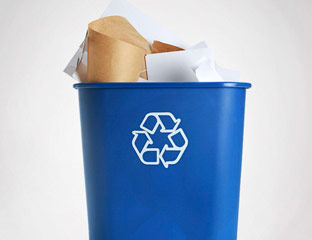
Plastic is almost everywhere around us, it’s cheap to make and has numerous uses in our everyday modern life. The downside of this is that plastic is a growing environmental problem because it doesn’t degrade or decompose. Plastic bottles and bags that don’t get recycled end up in the water or in the soil where they can remain for literally thousands of years before they decompose. The plastic that’s thrown in the ocean forms giant plastic islands that affect the marine wildlife. The organisms that live in the ocean often die because they asphyxiate on plastic pieces.
There’s not a single beach on this planet that’s not plagued with plastic. Even the rocky, snowy beaches of Antarctica have tested positive for micro-plastic contamination. There are more pieces of plastic in the water than there are plankton in all of the oceans. It’s a devastating state our oceans are in, and any change could take hundreds of years before showing results.
If you’re like any other person today, you’re an avid plastic user. If you want to make your daily habits more environmentally friendly, here are some tips on how to achieve that.
- Buy everything in bulk. There’s probably a store nearby that sells things such as rice, cereal, pasta and flour in bulk. Go to large farmers markets and buy all your fruits and vegetables in large quantities directly from the farmers.
- Reuse all plastic containers. The plastic boxes and containers that come as packaging can be reused many times, either as a way to store food or as some other type of container.
- Use a reusable water bottle. Don’t buy plastic water bottles or use paper or foam cups at the water dispenser. These almost never get recycled, and a reusable water bottle keeps your drinks fresher and colder.
- Invest in a water filtration system for your home. Chances are the tap water you have isn’t safe for drinking, so instead of buying all those unnecessary water bottles, filter the tap water to save both your money and your environment.
- Carry reusable shopping bags. Keep them in your car or your purse so they’re always on hand. You can also make them on your own from old t-shirts.
- Shop for your seasonal fruits and vegetables at your local market. You’ll avoid unnecessary plastic packaging, as you can carry them in paper or cloth bags.
- Pack your lunch in a reusable lunch box, made from glass or stainless steel. It’ll keep your food fresher and can be washed and used almost forever.
- If you eat a lot of bread, try making it yourself. Homemade bread will stay fresh longer and makes for much better toast than any other pre-packed bread you can buy at the store.
- When grocery shopping, avoid products that come with a Styrofoam or a plastic packaging. Opt for ones that have paper or cardboard ones that can be recycled.
- When eating out, bring a glass or a stainless steel container so you can put your leftovers there. Most restaurants use paper or plastic bags to pack them, so you can avoid using needles amounts of plastic.
- Carry your own stainless steel or silver utensils to avoid using disposable plastic ones.
- Use glass or stainless steel containers to store food at your home. Plastic ones wear out faster and can release dangerous toxins to your food.
- Make your own condiments and store them in metal boxes or glass jars.
- Make your own snacks instead of buying ones that come in a plastic or paper wrap.
- Use the leftovers you’d otherwise throw away for composting. They’ll do more good in your garden than in your thrash bag.
- Make your own cleaning products in reusable containers instead of buying new products and throwing out used plastic bottles all the time.
- Make your own detergent to avoid the bulky plastic packaging that’s sold in stores.
- Avoid using personal hygiene products that come in disposable plastic bottles. Opt for natural soaps and shower gels that come in bars, and use organic body butters from metal containers.
- Avoid using regular cotton pads and tampons, and switch to a menstrual cup or specialized menstrual underwear.
- When travelling, take your own hygiene products in reusable packaging to avoid using plastic disposable ones you’d get at a hotel.
- At a birthday party, use paper plates and cups made from recycled materials so you can recycle them again.
- Buy foods that come in glass containers instead of cans. Most food cans are covered with plastic and can’t be reused.
- Before buying anything made of or containing plastic, ask yourself if you really need it. You’ll avoid any needless hoarding and reduce the amount of plastic that’s released into the environment.
- Avoid buying pre-packed meals. Not only are they full of additives that are bad for your body, they’re often sold in plastic packaging that’s almost impossible to reuse.
- Wear clothes made from natural fabrics such as cotton, wool or linen.
